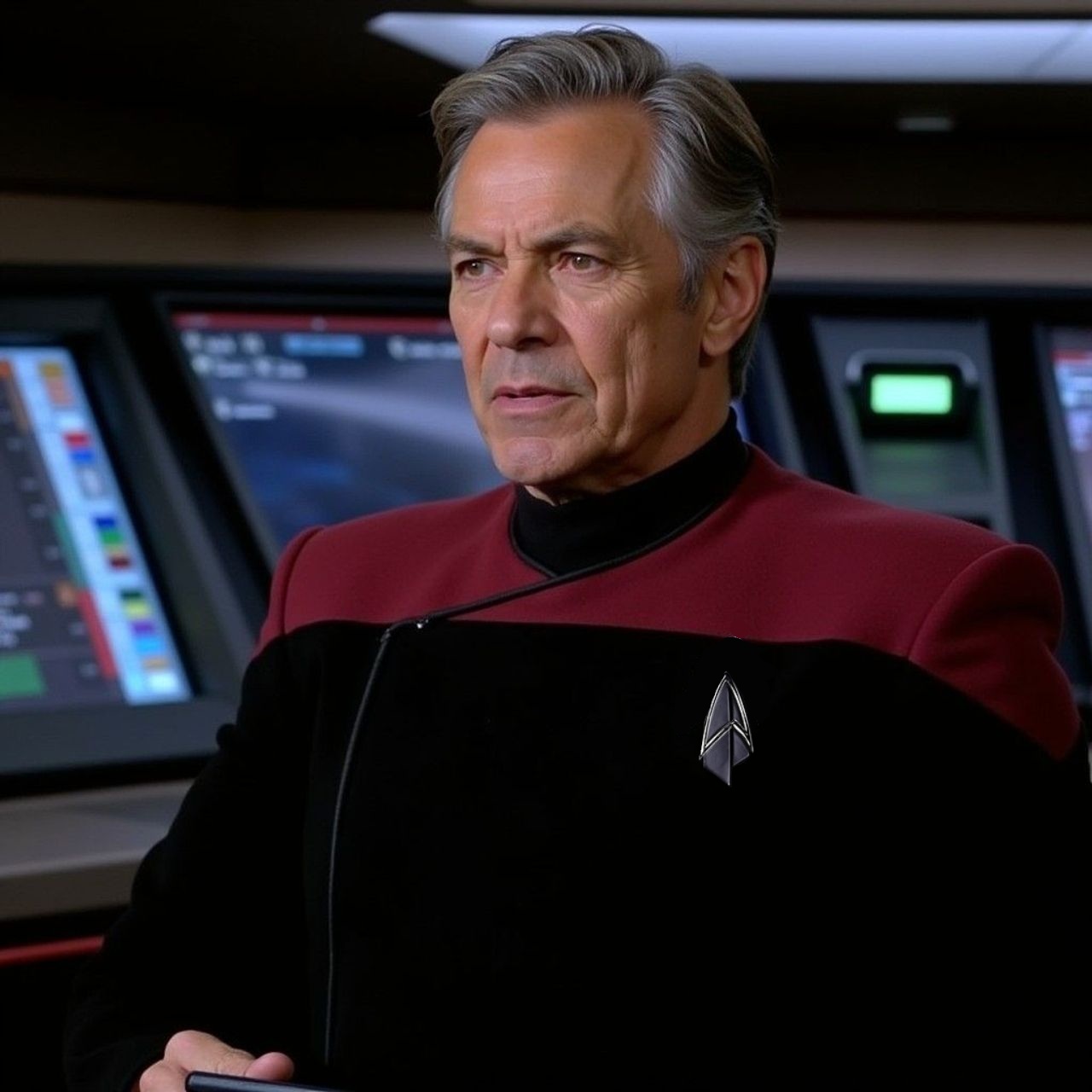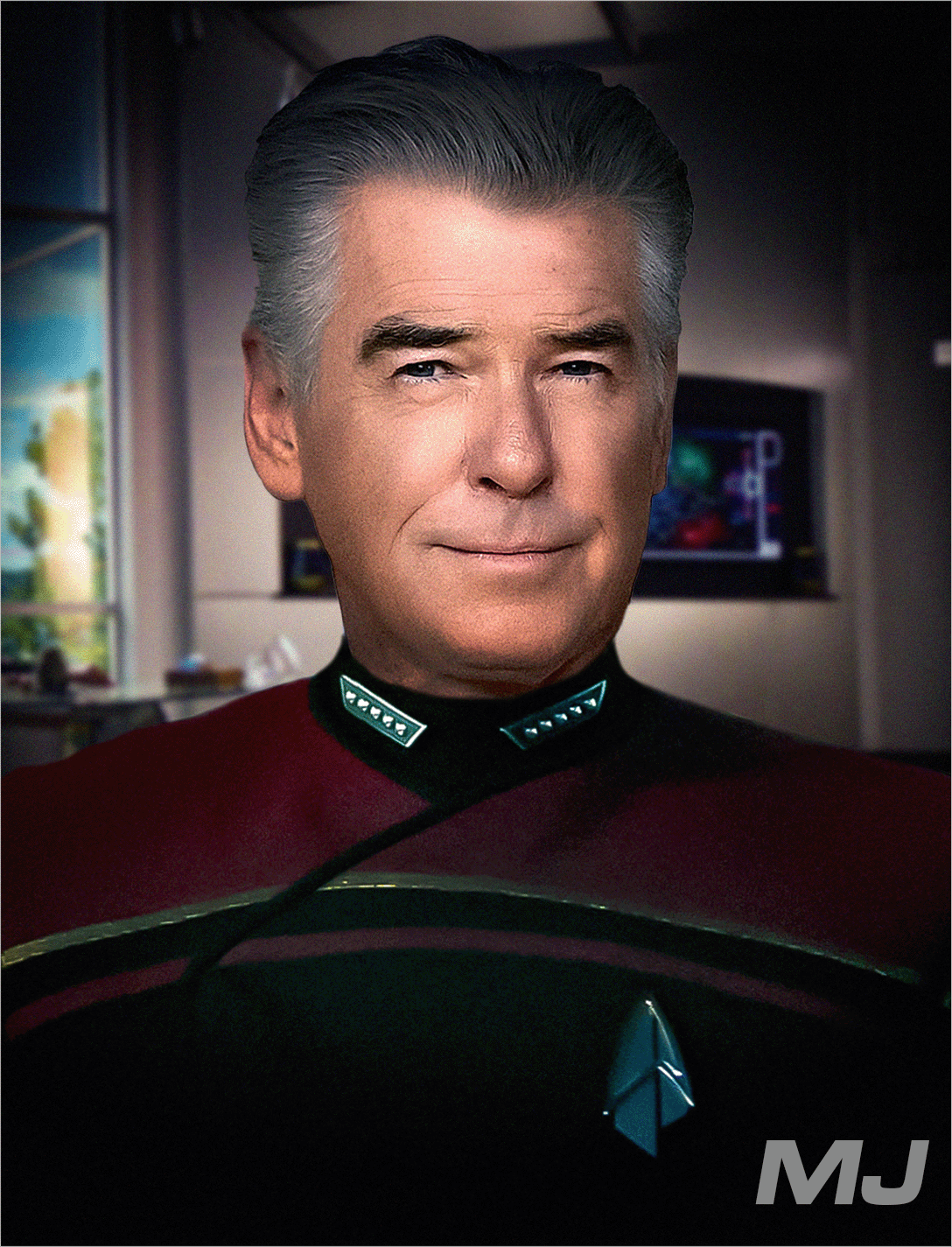Far from the white sand beaches and minimalist metropolitan beauty of Banksy City, a muscled duo snaked their way up fractured limestone that jutted hundreds of meters over Kyban’s Dai Sea. For many, the sheer exposure and difficult crimps of the White Cliffs would have been anything but relaxing, but for the pair who’d set out to flash the ascent during their shore leave, there was no better therapy than chalk, sweat, and pure physical exertion.
As they came upon a particularly complex formation that featured a series of narrow crags and overhanging ledges, Captain Jake Lewis didn’t hesitate. In a dynamic style, he powered through with a sequence of aggressive moves that relied on single-point holds and bold momentum swings to transition safely to the thin ledge on the other side.
Below him, his partner shook his head with an amused grin. “Impressive, but you’re gonna kill yourself someday with moves like that.” In a controlled environment, Captain Dorian Vox would climb as dynamically as anyone, but this was far from a controlled environment. This was the real world, and they were making their first attempt on a massive face without holodeck safeties or even a rope. “They teach three points of contact for a reason, you know.”
“Okay kid,” Captain Lewis chuckled as he looked down at the younger man. “Show me how it’s done then.” He knew his limits, he assured himself confidently. If he didn’t, he’d have been dead before Dorian had even graduated grade school.
For a moment, Captain Vox stared upward, studying the formation with his eagle eyes, taking in every detail. And then he began an intricate set of moves, deliberate and precise, relying on a balance between the rock’s natural contours and his own physical capabilities to clear the complicated section. A few moments later, he was standing beside his colleague atop the narrow ledge, enjoying the view of cerulean sea and the lush archipelago as they took a moment to recover before starting on the next traverse.
“You climb with the precision of a pilot, but you’re a captain now,” Captain Lewis joked. “As a captain, sometimes you’ve got to just go for it.” Given that Captain Vox had been commanding ships on the Federation’s roughest frontiers for nearly a decade, the comment might have been taken as condescending by some, but between these two, it was all just friendly banter. They’d been through the crucible together, and they shared a deep, mutual respect as comrades-in-arms.
“Like you and Reyes, the king and queen of reckless abandon?” Captain Vox teased back. “I’m pretty sure this is why you two keep busting up your ships.” The Polaris had been non-com for a month after the Battle of Nasera, and between the suicide run through the Ciatar Nebula and the dive through the Roche lobe of Beta Serpentis, they’d almost blown the Serenity to bits twice. And that was just between April and July. At least it had been quiet since then as the squadron settled into supporting the ramp up in the Archanis Sector.
“I see how your eyes light up as we charge into battle,” Captain Lewis countered with a devious smile. “Always figured that meant you wanted to go out in a blaze of glory like the rest of us.” Captain Vox has been his staunchest ally calling for action in the shadow of Wolf 359, and the children of the Borg might have succeeded in their plot to summon the Collective if Vox had not thrown his lot in with Lewis.
“I love the adrenaline pump as much as the next guy,” Captain Vox nodded. “But I would like to make it to retirement someday.” It was still a ways off for him, at least another decade or two. “Isn’t that what we all want in the end? A quiet retirement?”
“Meh, I’m starting to get into my twilight years,” Captain Lewis shrugged. “It’s not all they make it out to be.” Getting old was overrated. On Nasera and then on Earth, there’d been moments when, for the first time in his life, he could feel his age creeping up on him. And he didn’t like it one bit. “Besides, what does retirement have in store for you?”
“More first ascents, I guess,” shrugged Captain Vox as he looked up at the next block of rock, a near featureless face for them to find their way through next. The galaxy was like that too, out beyond the borders of the major powers. “Always figured that someday I’d get myself a little civvie ship and just go see what’s out there in the great beyond.”
Captain Lewis looked up the wall. The wall wasn’t going to climb itself. It was time to get back to climbing. But as he re-chalked his hands, their combadges beeped in unison.
“Admiral Reyes to all Polaris Squadron personnel. Sorry to cut your vacation short, but we have a rapidly developing situation. Report to duty stations and prepare for immediate departure.”
Captain Vox looked over at Captain Lewis. Fleet Admiral Allison Reyes, the squadron CO, had been insistent on the soiree to Kyban. Lieutenant Morgan’s suicide had been a wake up call for her that, in the wake of Nasera, Minara, Ciatar, Earth, and Beta Serpentis, everyone was frayed and needed a break for mental health. If she was now going back on that, cutting their leave a week short, something had gone seriously wrong. After the Dominion and the Borg, the captains of the Serenity and the Diligent could only wonder what it was this time.
“Senior Staff and ASTRA Leads, please report directly to the CIC.”
The two hundred meters of wall that hung above them would have to wait. Just like their shared love for limestone, Captain Lewis and Captain Vox shared a devotion to duty, and the call was clear. The vacation was over. It was time to get to work.
“Lewis to Polaris. Two to beam directly to the CIC.”
Captain Vox glanced at his colleague, and then back at himself. Their tank tops and cargo pants were covered in chalk, and sweat glistened off their toned arms and tanned faces. They were going to make an interesting sight walking into the nerve center of Polaris Squadron.
And then the bright sun, crashing waves, and the white wall of Kyban’s equatorial archipelago were gone, replaced by the cool interiors and dim fluorescence of the USS Polaris‘ Command Information Center.
At nearly three dozen consoles ringing a two stories tall situational display, flight controllers, operations staff, and tactical officers shouted instructions as they coordinated the rapid reactivation of the squadron’s four ships and the rushed return of the nearly two thousand personnel that had been enjoying a lazy day on Kyban. Under normal conditions, such an undertaking would have taken the better part of a day, but Admiral Reyes had told them they had thirty minutes, and then the squadron was leaving – with or without its people. That meant the operators in the CIC were running it like a full-scale tactical operation.
“Shuttle Two-Six, cleared to Polaris Bay Four.”
“Shuttle Zero-Four, slow to four zero, hold at alpha.”
“Diligent, you got a backlog. Tell those crewmen to hustle their bustle off the transporter pads.”
“Shuttle One-Nine, proceed after Three-One to Serenity Bay Two.”
Together, Captains Lewis and Vox crossed the room, proceeding directly to the briefing center just off the main floor, where the squadron leadership was gathering at the Admiral’s request.
As they stepped into the briefing room, Commander Lee gave them a once over. “Didn’t you hear the Admiral? This trip was about rest and relaxation,” she said as she rolled her eyes.. “I trust you both were taking all the necessary safety precautions?” It wasn’t hard to figure out what they’d been up to, given the thick layer of chalk and sweat over their skin and clothes, and she had no doubt they had not been taking the appropriate precautions.
“All the necessary ones,” Captain Lewis stated firmly, causing Captain Vox to laugh out loud. “But Cora, you appear to have missed the memo altogether.” In contrast to many of the other officers funneling quickly into the room, the youngest of the COs was dressed in her duty uniform with her hair tied up in a tight bun like it was a regular workday.
“Got me there,” Commander Lee chuckled. “I was actually over on your ship, tinkering with Commander Sharpe on some ideas we had to let you push your baby even harder.” Over the last few months, the prodigious engineer had found a kindred spirit in the Serenity‘s Chief Engineer, a man who, over his two decades in Main Engineering, had mastered the art of keeping ships in one piece while their COs did their best to break them. If the past few months were any indication, that talent would come in handy here. It had been nothing but pedal to the metal ever since she first linked the USS Ingenuity up with the USS Polaris in the Eplulap Nebula on the way to Nasera.
Behind them, Fleet Admiral Allison Reyes stepped into the room, flanked by Dr. Sh’vot, the geophysicist from the Serenity, and Dr. Tom Brooks, the aged astrophysicist they’d sprung from the New Zealand Penal Colony last April. While the Senior Officers of Polaris Squadron and the leads from the Advanced Science, Technology and Research Activity took their seats, the trio made their way to the front of the room. Everyone was present except Fleet Captain Devreux, who was up on the bridge of the Polaris supervising squadron reactivation.
“This is the Vespara system,” Admiral Reyes jumped right into it without any cordialities. Behind her, an astrometrics display came up on the main screen. “By most measures, it is a stock standard system with a K-type main sequence orange dwarf and a single class M planet, Vespara Prime, within its habitable zone.” Behind her, a new set of vectors appeared on the display. “Or it was a stock standard system until a couple hours ago. This morning, at approximately 1030 hours, Archanis Sector Operations received a distress call reporting that, based on primitive terrestrial observations, the planet’s orbit had begun to decay rapidly.” The admiral advanced the display to at a rate of one day per second, and in less than thirty seconds, the issue was clear to all.
“Planets do not just fall out of the sky,” Dr. Luke Lockwood noted pointedly. Planetary orbits were a function of Newtonian mechanics and Kepler’s laws, which were both foundational and elementary aspects of astrophysics. “And certainly not this quickly.” The head of astrophysical and exotic sciences for the Advanced Science, Technology and Research Activity knew as well as anyone that celestial time horizons were measured, not in centuries and millennia, but in megaanums and longer. Only in the rarest of situations, such as the Romulan supernova, did such horizons shrink to even the scale of human lifetimes, let alone to mere weeks.
“They do if a massive gravity sink appears out of nowhere,” Dr. Brooks countered as he stepped forward. “Boosting long-range sensors to max, we were able to detect subtle shifts in graviton background radiation that suggests the appearance of a new celestial body within the Vespara system.”
“What sort of a celestial body?” Dr. Lockwood asked curiously. Just as orbits did not decay spontaneously, neither did celestial bodies appear spontaneously. Using the 2.08E+30 and 4.81E+24 figures next to the star and planet respectively, and the 29.8 km/s radial velocity vector extending from the planet towards the sun, it was easy to calculate in his head the approximate mass of such a body. “You’re suggesting something about fifty to sixty stellar masses that just magically manifested out of the void.”
“Correct, and from here, we have no idea what,” Dr. Brooks smiled, a twinkle in his eye. He loved a good mystery. “And that’s sort of the fun in it, isn’t it?” Fun was not how Admiral Reyes or Dr. Sh’vot would have described an orbital trajectory threatening a planet-wide apocalypse within weeks. “Given the absence of any spectral emissions, some form of a gravitational singularity would be my best guess.” He slid a PADD across the table.
“Curious,” was all Dr. Lockwood had to say as his voice tapered off, falling into a land of hypotheticals as he reviewed the telemetry and the calculations on the PADD.
“And what are they picking up on the surface of Vespara?” asked Captain Vox. “They’ve got to have better readings from down there than we have out here.” He’d never heard of Vespara before, but even a backwater Federation colony with basic astrometric sensors would have more than what they had from half a sector away.
“Unfortunately, that’s where we hit a snag,” Admiral Reyes admitted. “Vespara Prime is fairly unique as far as Federation colonies go, a place primitive and agrarian by choice, where the six million who call it home were brought together by a single goal: to live unburdened by the technologies that the rest of the galaxy takes for granted. It is a place without factories or replicators or even PADDs, where its residents focus on simplicity and sustainability.”
Sitting deep within the core of one of the most advanced ships Starfleet had ever produced, such a notion was alien to those gathered in the briefing room.
“Admiral, if they’ve renounced technology, how did they observe even this much?” Lieutenant Emilia Balan, the cultural affairs analyst from the Advanced Science, Technology and Research Activity, asked curiously. “An abacus?”
“Not far off,” chuckled Admiral Reyes. “A seventies-era tricorder. A man by the name of Imbalta hung onto it when he immigrated to Vespara, and this morning, when the sun started flickering and the climate got wonky, he used it to calculate the shifts in inclination and position.”
“It’s a lot to surmise from a tricorder,” Dr. Lockwood cautioned as he looked up from his PADD and over, through the glass of the briefing room, into the core of the CIC, where operators were hustling to get the squadron ready for departure. “Are we certain it warrants a squadron-level response?” Faint gravitational shifts and the fears of an old man playing with a calculator hardly seemed worthy of sending more than a runabout to check it out.
“Page over,” Dr. Brooks said, gesturing back at the PADD his colleague was holding. “Before he gave it all up, Dr. Imbalta was a preeminent warp field theorist.” Dr. Lockwood paged over and found himself staring at a research paper published in 2371 out of the Zefram Cochrane Institute for Advanced Theoretical Physics. It bore nearly twenty co-authors, many of them pioneers in modern subspace theory, and the lead author was none other than a Dr. Itziki Imbalta. “If his math was that good back then, I’d take him at face value on something as simple as a Kepler three-body problem.”
“He also made the call at risk to himself,” Admiral Reyes observed. “While Vespara Prime has a subspace transceiver for emergencies, based on records from Starfleet Communications, we have not received a call from them in over a decade. Dr. Imbalta warned on the call that he did not think his people would take kindly to the choice he’d made, but that he felt he couldn’t not call after what he’d discovered.”
“The near assurance of the death of your world can be motivating,” Dr. Sh’vot nodded. “As added assurance, the climatological observations he reported also align with what you’d expect given his rudimentary measurements and, if he’s even close to right, it’s only a matter of weeks before Vespara Prime falls out of its habitable zone.”
“And I’d surmise, based on what you’re saying about their technology,” Commander Lee jumped in. “That they don’t have the sort of environmentally sealed facilities that would allow them to protect themselves from such climatological shifts, do they?” The engineer’s mind was already turning on ideas about what they might fabricate to extend habitability at such a massive scale and in such a short time.
“No, not at all,” Dr. Sh’vot confirmed. “Due to a synchronicity between their orbital ellipsis and their planetary inclination, Vespara Prime enjoys a climate so temperate on its southern hemisphere, where all its major settlements are, that brick, clay and stucco are more than enough to provide year-round insulation.”
“Unless, of course, they suddenly fall into the sun.”
“Unless that, yes,” Dr. Sh’vot nodded bleakly.
“Given the potential for disaster, and the time-sensitivity of the situation, we’re leading with the front foot,” Admiral Reyes closed. She’d thought about sending one of their light cruisers first, but it would take a day to get out to Vespara, and then another day for the squadron to respond. “If it’s a false alarm, we’ll be swimming in the Dai Sea again by Thursday afternoon.” But if it wasn’t a false alarm, then they were going to need the full might of Polaris Squadron – and probably a small miracle – to save the six million who called Vespara home.

 Bravo Fleet
Bravo Fleet


















